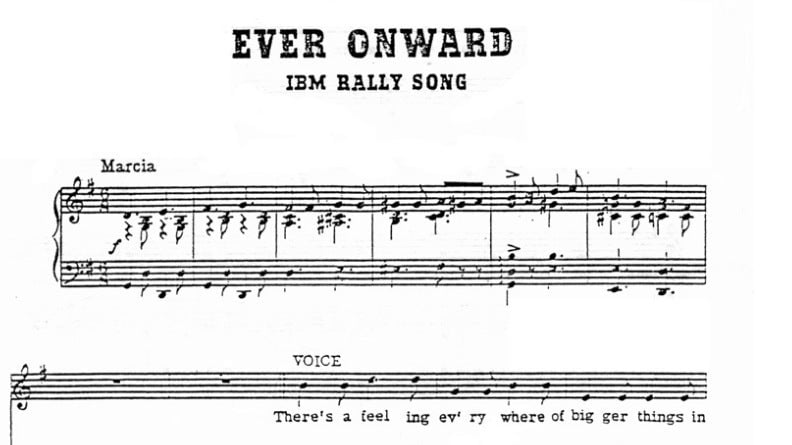‘Hail to the IBM’ and other corporate anthems to sing along to
Your ties of friendship cannot sever,Your glory time will never stem,We will toast a name that lives forever,Hail to the IBM


IBM’s corporate anthem “Hail to the IBM,” lyrics excerpted above, was written by a Metropolitan Opera singer and debuted in 1939 at a company dinner. The histories of this anthem, as well as three other tunes from the “IBM Songbook”, are available on the company’s official web site.
Corporate anthems – not to be confused with commercial jingles — hearken to the era of the “company man,” when a corporation was as much caretaker as employer. The company would provide a pension and possibly a stipend for widows, and in return the employee would give his lifelong allegiance. Many corporate anthems are in the same vein as the IBM anthem, which, as one can tell from the tinny recording of “Hail to the IBM,” sound like a cross between the “Internationale” socialist theme and “Fair Harvard.”
In modern times, the corporate anthem is probably most commonly associated with 1980s Japanese corporate culture, which prided itself in mutual loyalty and one-way fealty between company and businessman. According to a 1985 academic paper on the psychological impact of Japanese company songs on employees, it was not unusual for “plant workers as well as office employees (to) start their day with the company song, exercise with it during the short mid-day recess, and even finish their work with the company song.”
In this global economic crisis, one would think that cynicism about capitalism and job security would have eclipsed the corporate anthem. While it’s a safe assumption that very few companies start their day with a song, a surprising number of modern-day corporations continue to commission company anthems.
One notorious example was that of accountancy firm KPMG, which became semi-viral in 2001 after UK-based blogger Chris Raettig posted the song on his site (now defunct). KPMG then reportedly made the hilarious claim in a letter that it was illegal for anyone to create an unauthorized link to kpmg.com: “Please be aware that such links require that a formal Agreement exist between our two parties, as mandated by our organization’s Web Link Policy.”
KPMG was pilloried in the press; as Wired remarked at the time, “KPMG prides itself on its ‘e-business’ savvy… But this week, several web site owners were wondering whether KPMG’s Internet acumen was really worth anything at all.” The aggravated media attention led to several parodic covers of the anthem, including an unparalleled Teutonic Master Mix. The KPMG press office did not return Quartz’s calls and messages requesting comment.
We’ve rounded up some of our favorite anthems from across the globe. Please send us any amazing ones you discover on your own.
Volkswagen: “We’re really OK, we’re really OK,” reassures the men’s chorus. The song has a bouncy, symmetrical Europop feel, not unlike this German fourth-place Eurovision Song Contest entry. The lyrics were written by Volkswagen employees, according to the company press office in Wolfsburg.
Kaufland: This employee motivational song for a German megastore chain exults, “Life is beautiful today, I really want to go to work.”
Hero Motocorp: Technically, this song doesn’t qualify as an anthem because it was used for a TV commercial for the Honda-affiliated motorcycle company based in India. But we’re including it because it’s too wonderful to be ignored, having been written and performed by AR Rahman, who composed the soundtrack for the 2008 film Slumdog Millionaire. Its lyrics call upon the “hero within us.”
Daehan Tong Eun: This Korean freight company’s solemn hymn, which claims its employees are “rewriting history,” is patriotic and the video features a lot of trucks.
Japan Break Industries: It’s easy to see why this song, the anthem for a now-defunct Japanese demolition company, went semi-viral in 2003, reaching number 22 in the Oricon pop singles charts in Japan. What’s not to like about an accompanying music video that resembles a cross between Rick Springfield and Triumph of the Will? The song became popular in South Korea as well, where news of the company’s 2009 demise was mourned in the Korean blogosphere.